Republican governors ask Biden administration to rescind Title IX guidance
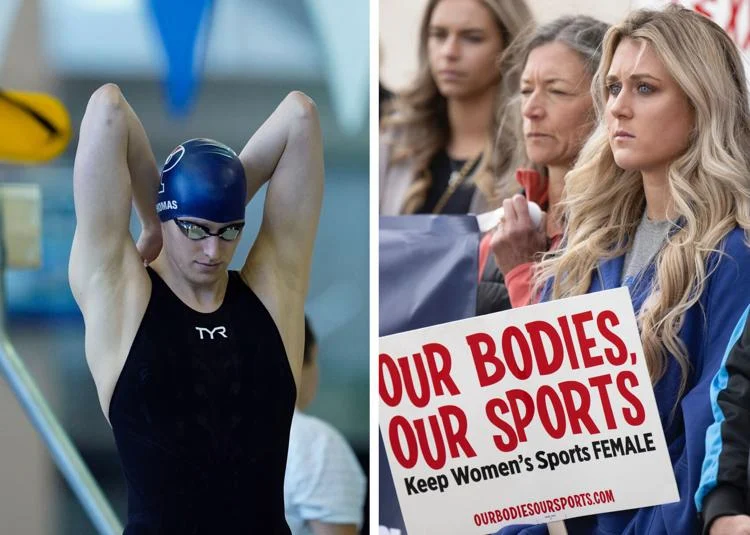
Twenty-five of the nation’s 26 Republican governors have asked the Biden administration to shelve its intent to expand Title IX protections to transgender athletes. The letter, led by the signature of Mississippi Gov. Tate Reeves, says the U.S. Department of Education’s proposed regulation should be withdrawn pending litigation that could be addressed by the U.S. Supreme Court. “The Department’s proposed regulation would attempt to coerce compliance with an uncertain, fluid, and completely subjective standard that is based on a highly politicized gender ideology,” the letter reads. The letter comes as the public comment period ends Monday on a proposed revision to Title IX that would ban state and local governments from prohibiting transgender students from participating on sports teams aligned with their gender identity. Title IX was created to increase opportunities for female athletes. Federal funds can be withheld from those found to be in violation. The law, which was passed in 1972, prohibits discrimination based on sex for school districts, universities, museums, and other educational institutions that receive federal funds. “Compelling a subjective, athlete-by-athlete analysis controlled by a student’s self-identified ‘gender identity’ enforced under threat of Department retribution affords no clarity,” the letter reads. “It does the opposite. This ‘fluid’ subjective standard ensures chaos and confusion in schools and will no doubt result in protracted and disruptive litigation.” Twenty-one states prohibit transgender students from participating on sports teams that do not align with their biological sex at birth, according to the Movement Advancement Project that tracks state policies. The letter was signed by Alabama Gov. Kay Ivey, Alaska Gov. Mike Dunleavy, Arkansas Gov. Sarah Sanders, Florida Gov. Ron DeSantis, Georgia Gov. Brian Kemp, Idaho Gov. Brad Little, Indiana Gov. Eric Holcomb, Iowa Gov. Kim Reynolds, Missouri Gov. Mike Parson, Montana Gov. Greg Gianforte, Nebraska Gov. Jim Pillen, Nevada Gov. Joe Lombardo, New Hampshire Gov. Chris Sununu, North Dakota Gov. Doug Burgum, Ohio Gov. Mike DeWine, Oklahoma Gov. Kevin Stitt, South Carolina Gov. Henry McMaster, South Dakota Gov. Kristi Noem, Tennessee Gov. Bill Lee, Texas Gov. Greg Abbott, Utah Gov. Spencer Cox, Virginia Gov. Glenn Youngkin, West Virginia Gov. Jim Justice, and Wyoming Gov. Mark Gordon. The signature of Vermont Republican Gov. Phil Scott is not on the letter. Republished with the permission of The Center Square.
As grocery prices soar, push grows to end sales tax on food
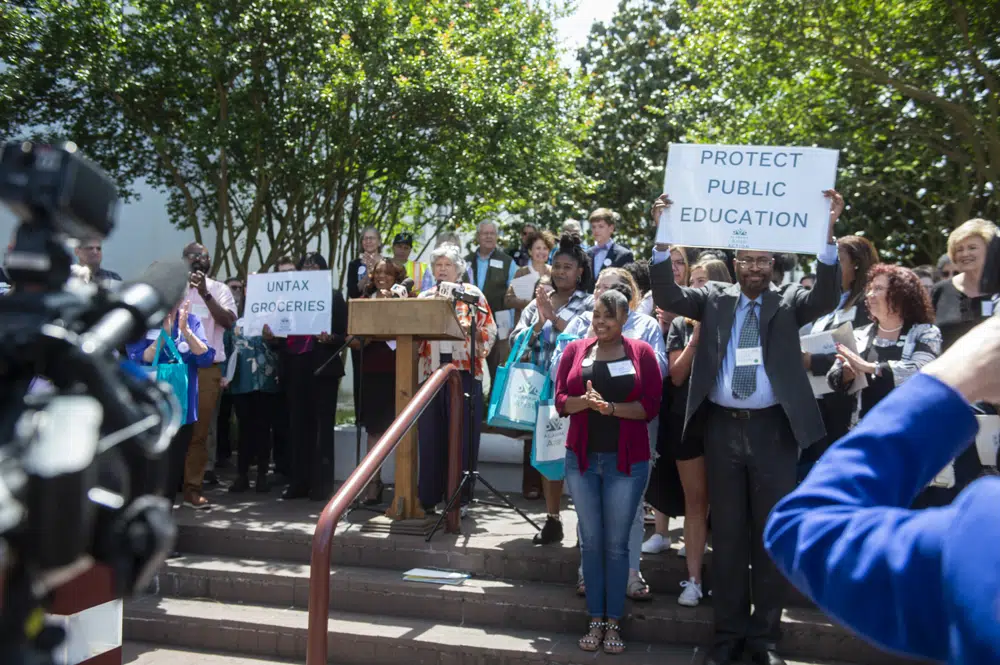
Alabama is one of only three states that tax groceries at the same rate as other purchases. But as food prices soar — and as the state sees a record budget surplus — Alabama lawmakers are considering removing, or phasing out, the state’s 4% sales tax on food. Competing proposals are being introduced by Democrats and Republicans in the Alabama Legislature to end the sales tax on all, or at least some, groceries. While the idea has been proposed for decades in Montgomery, it has gained traction this session. Alabama Arise, an organization that lobbies for policies that would benefit low-income families, said the average Alabama family spends $600 a year on the state grocery tax, and removing it would be a lasting benefit to families struggling to make ends meet. “Our families are hurting. We can’t afford to pay 4% on top of already expensive food,” Robyn Hyden, executive director of Alabama Arise, said during a Tuesday press conference and rally outside the Alabama Statehouse. Only Alabama, Mississippi, and South Dakota still tax groceries at the full state sales tax rate. South Dakota Gov. Kristi Noem had urged lawmakers to remove that state’s sales tax on groceries, but lawmakers instead approved a general sales tax cut. Various lawmakers, mostly Democrats, have proposed removing the state sales tax on food since at least the early 1990s, but the proposals were never approved, partly because of the projected blow to education funding. The tax on groceries provides more than $600 million annually to schools, according to estimates from the Legislative Services Agency. Alabama primarily uses sales and income tax collections to provide the state’s share of education funding. Soaring grocery prices, coupled with a record budget surplus, have lawmakers in both parties throwing their support behind the idea. But the proposals vary on if the tax would be removed on all food items and if the revenue stream would be replaced. “We can all agree on this: That the tax on groceries is just plain, wrong and unfair,” Sen. Merika Coleman, D-Pleasant Grove, said. Coleman’s proposal would let voters decide whether to remove the state sales tax on food and replace the money by ending the deduction that allows Alabamians to deduct federal income tax payments before computing their state income taxes. She said the tax break disproportionately lowers taxes for the wealthiest people. “Let them choose whether they prefer a tax loophole that mostly benefits the richest few or if they want a grocery tax cut that benefits everyone,” Coleman said. The Alabama Republican Party on Tuesday released a survey of registered voters that it said showed a vast majority support removing the sales tax on food. “One of the core beliefs of the Republican Party is that government exists for the benefit of the people, not the other way around. We want to help those families and individuals struggling with food prices right now. It’s time to end the grocery tax,” Alabama Republican Party Chairman John Wahl said in a statement. Republican Sen. Arthur Orr, who chairs the Senate Finance and Taxation Education budget-writing committee, has proposed to phase out the state sales tax on some foods, such as milk, eggs, vegetables, fruit, whole-grain bread, and baby formula. The bill would use the list of food items that are covered by the federal Women, Infants and Children nutrition program to decide what would be untaxed. Orr said last week that would offer relief to families while also limiting the blow to the education budget. That WIC definition, if used, would leave the state sales tax on meat, desserts, and many other items. Others have discussed using the list of foods eligible under the Supplemental Nutrition Assistance Program. That would remove the state tax on most grocery items, but leave it on items such as alcoholic beverages or prepared meals that are hot at the point of sale. The Legislative Services Agency estimated that would cost the state $608 million annually. Hyden said their organization supports the “broadest possible” proposal for removing the tax on food, as well as proposals that would protect education funding. State Rep. Penni McClammy, the daughter of the late Rep. Thad McClammy, said during the Alabama Arise press conference that she has shared the difficult decisions many families face in trying to stretch a budget at the grocery store. “I was a caregiver. I know what it feels like to make decisions on buying Depends, Ensure, medication. What we call healthy food is the most expensive food in the grocery store,” McClammy, D-Montgomery, said. Republished with the permission of The Associated Press.
GOP governors to Joe Biden: Student loan plan will be costly for American taxpayers
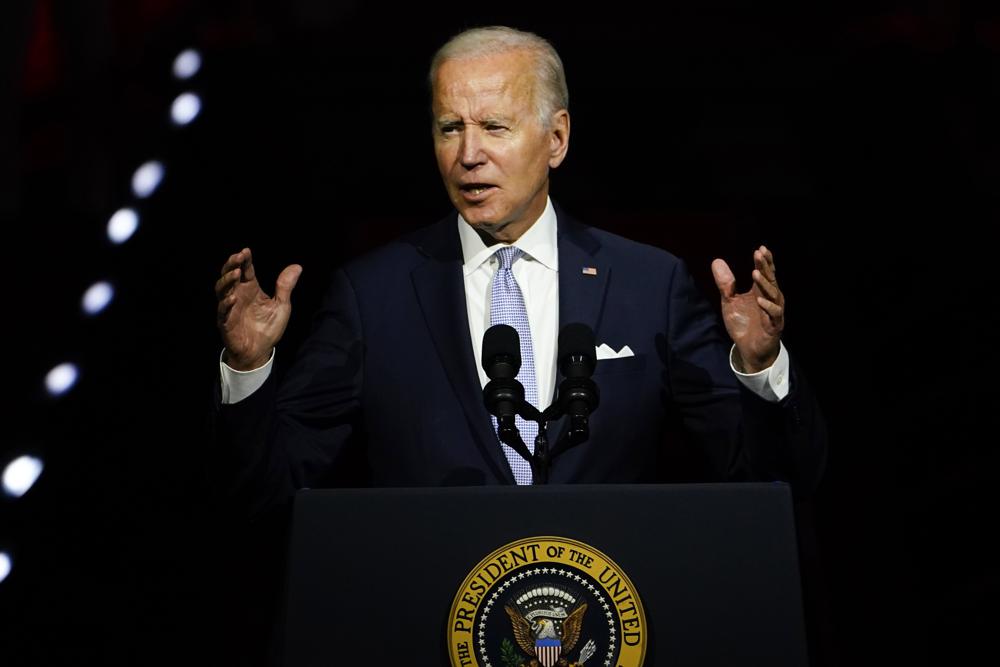
President Joe Biden’s student loan forgiveness plan will be costly for American taxpayers, a coalition of GOP governors said in a letter sent Monday to the White House. The letter, signed by 22 GOP governors, tells Biden to “withdraw” the plan, citing cost estimates of up to $600 billion, or $2,000 per American taxpayer. “As governors, we support making higher education more affordable and accessible for students in our states, but we fundamentally oppose your plan to force American taxpayers to pay off the student loan debt of an elite few,” the coalition wrote. The coalition includes Alabama Gov. Kay Ivey, Alaska Gov. Mike Dunleavy, Arizona Gov. Doug Ducey, Arkansas Gov. Asa Hutchinson, Florida Gov. Ron DeSantis, Georgia Gov. Brian Kemp, Idaho Gov. Brad Little, Iowa Gov. Kim Reynolds, Maryland Gov. Larry Hogan, Missouri Gov. Mike Parson, Montana Gov. Greg Gianforte, Nebraska Gov. Pete Ricketts, New Hampshire Gov. Chris Sununu, North Dakota Gov. Doug Burgum, Ohio Gov. Mike DeWine, Oklahoma Gov. Kevin Stitt, South Carolina Gov. Henry McMaster, South Dakota Gov. Kristi Noem, Tennessee Gov. Bill Lee, Texas Gov. Greg Abbott, Utah Gov. Spencer Cox, and Wyoming Gov. Mark Gordon. “At a time when inflation is sky high due to your unprecedented tax-and-spend agenda, your plan will encourage more student borrowing, incentivize higher tuition rates, and drive-up inflation even further, negatively impacting every American,” the governors added. Biden announced the plan last month during an address from the White House. “Many people – many people can’t qualify for a mortgage or buy a home because the debt they continue to carry,” Biden said. “A lot of folks are even putting off starting families because of the cost, and the dream of starting or owning your business is just way off in the distance with a debt that’s – that so many are saddled with.” The plan forgives $10,000 in federal student loan debt for those who make less than $125,000 annually, while federal Pell Grant recipients will be forgiven $20,000. The Committee for a Responsible Federal Budget has estimated that the plan’s total cost would be $440 to $600 billion. Republished with the permission of The Center Square.
Kay Ivey tells reporters she has a ‘clean bill of health’

Alabama Gov. Kay Ivey on Monday made her first public appearance in nearly three weeks, telling reporters she was in good health but also declining to say whether she had undergone any recent medical treatment. Ivey toured a science and technology lab at a Montgomery elementary school in her first public appearance since an August 2 groundbreaking ceremony, news outlets reported. The gap between appearances fueled speculation about the 77-year-old governor’s health. “I’ve got a clean bill of health from the doctors, and I’m looking forward to serving for four more years as governor,” Ivey told reporters. Ivey brushed aside questions about whether she had recently undergone medical treatment in a hospital and did not directly answer, news outlets reported. “It just seems like a lot of you just want to will these rumors into being, and that just isn’t going to happen,” the governor responded, according to al.com. “I’ve got a clean bill of health from the doctors. That’s what matters, and I’m looking forward to serving four more years as your governor.” Ivey’s office, on August 12, began releasing occasional photos of her at work to combat the rumors, beginning with an Aug. 12 photo of her greeting South Dakota Gov. Kristi Noem at an airport when Noem arrived in Alabama for a speech. Ivey announced in 2019 that she had been diagnosed with early-stage lung cancer and would undergo radiation treatments. In 2020, she said the cancer appeared to be gone and that her doctor considered her free of the disease. Ivey easily won the GOP gubernatorial nomination without a runoff in May; Ivey is a heavy favorite over Democratic gubernatorial nominee Yolanda Flowers in the November general election. The rumors about possible health concerns came as a deadline approaches to replace candidates on the November ballot. Republished with the permission of The Associated Press.
Kay Ivey’s office releases photos after dismissing health rumors

Alabama Gov. Kay Ivey’s office released photos of her greeting South Dakota Gov. Kristi Noem at an airport on Friday, a day after it dismissed rumors that Ivey was having health issues just months ahead of the general election. The four photos showed Ivey, 77, with Noem beside a small jet that landed at the regional airport in Montgomery, where Noem was among the speakers scheduled to address an Alabama Republican Party fundraising dinner. Ivey was last seen in public on August 2 at a groundbreaking ceremony. On Thursday, Ivey’s office said she remained “healthy and cancer-free” as it knocked down rumors that she was having medical problems. Still, the governor’s office did not respond to questions asking about Ivey’s upcoming schedule, her whereabouts this week, and whether she had been in the hospital in the past four weeks. Ivey, who easily won the GOP gubernatorial nomination without a runoff in May, announced in 2019 that she had been diagnosed with early-stage lung cancer and would undergo radiation treatments. In 2020, she said the cancer appeared to be gone and that her doctor considered her free of the disease. Ivey is a heavy favorite over Democratic gubernatorial nominee Yolanda Flowers in the November general election. Republished with the permission of The Associated Press.
Governors pan SEC climate disclosure proposal as unprecedented federal overreach
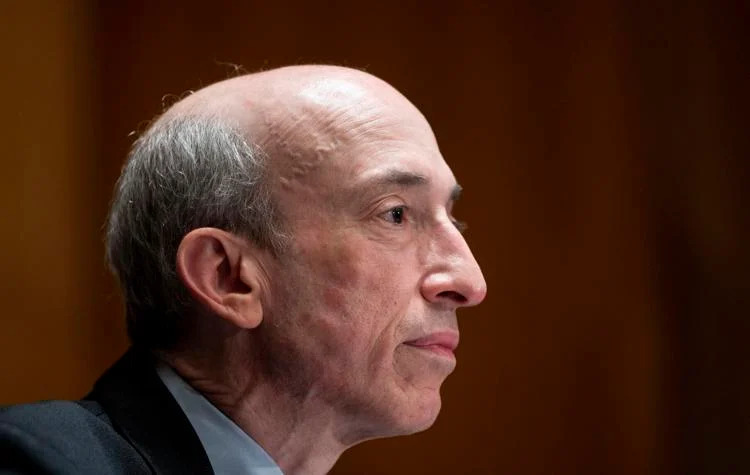
Sixteen Republican governors are asking the Biden administration to withdraw a proposed rule by the U.S. Securities and Exchange Commission that would require companies to disclose some climate-related investment information in annual reports and registration. The governors called the move an “unprecedented level of federal overreach” in a letter sent Tuesday to President Joe Biden and SEC Commissioner Gary Gensler. “The proposed rule will harm businesses and investors in our states by increasing compliance costs and by larding disclosure statements with uncertain and immaterial information that the federal government – let alone the SEC – is not equipped to judge,” the governors said in their letter. The governors said it’s OK for companies to disclose the information voluntarily. “However, since climate change models vary dramatically, the notion of evaluating investment risk based on such uncertain variables is inherently subjective and unreliable,” they wrote. “Moreover, such disclosures would serve to confuse investors as to how to judge true financial risk, significantly reducing market efficiency. It is precisely the type of question where government should not impose its own judgments of what constitutes material risk in place of managers.” The rule “appears part of an ongoing effort across the federal government to penalize companies involved in traditional energy development,” the governors said. “Until recently, the Biden administration explicitly refused to issue new oil and gas leases on federal lands and is now considering only a fraction of the lands that should be available,” they wrote. “In addition, the Council on Environmental Quality is rolling back reforms to the environmental review process, the President has denied key pipeline and other permitting applications, and officials throughout the Biden Administration are rhetorically discouraging investment in oil and gas development.” SEC officials said companies are interested in climate-related information. “The results of multiple recent surveys indicate that climate risks are among the most important priorities for a broad set of large asset managers,” the SEC said in its 140-page report. “PWC reported in their Annual Global CEO Survey that in 2016, only 39% of asset and wealth management CEOs reported that they were concerned about the threats posed by physical risks brought about by climate change, whereas this figure increased to 70% in 2021.” The SEC extended the comment period on the proposed rule from May 20 to June 17. The commission is accepting electronic comments. The letter is signed by Kay Ivey of Alabama, Mike Dunleavy of Alaska, Doug Ducey of Arizona, Asa Hutchinson of Arkansas, Brad Little of Idaho, Kim Reynolds of Iowa, Tate Reeves of Mississippi, Mike Parson of Missouri, Greg Gianforte of Montana, Pete Ricketts of Nebraska, Doug Burgum of North Dakota, Kevin Stitt of Oklahoma, Kristi Noem of South Dakota, Greg Abbott of Texas, Spencer Cox of Utah and Mark Gordon of Wyoming. Republished with the permission of The Center Square.
Kay Ivey, challengers race to right in Alabama GOP primary
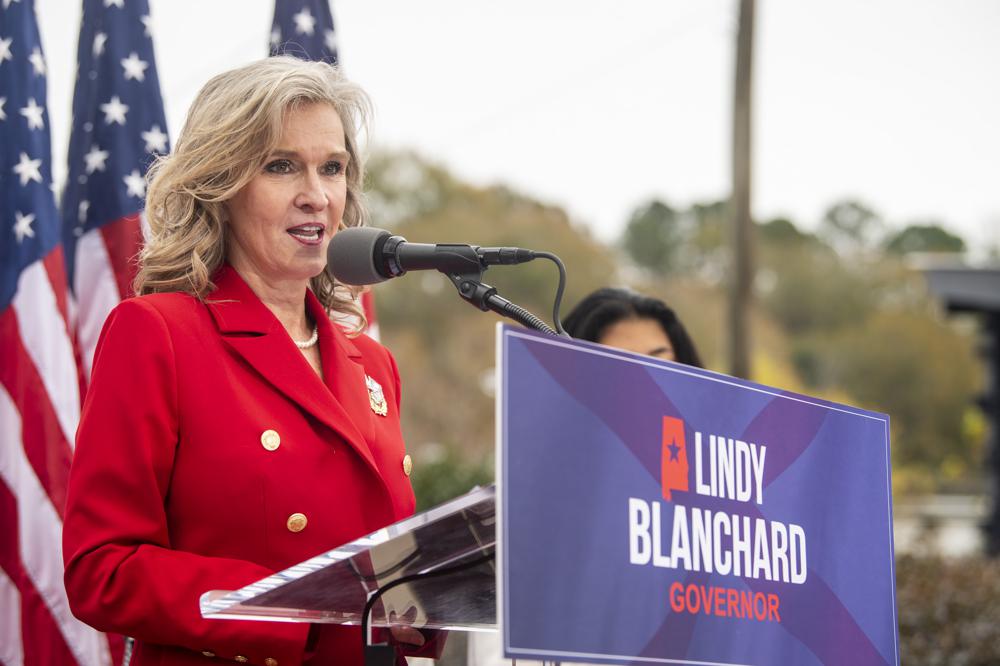
In a pair of campaign ads this GOP primary season, Alabama Gov. Kay Ivey falsely declares the election was stolen from Donald Trump and accuses the federal government of “shipping illegal immigrants” to the state. “My message to Biden: No way, Jose,” she says. But a competing ad by former Trump ambassador Lindy Blanchard calls Ivey a “tax-hiking Fauci-loving” liberal, swiping at her for actions during the COVID-19 pandemic and a gas tax increase. Alabama’s Republican primary has become a race to the right, with candidates staking out extreme positions on abortion, immigration, and LGBTQ issues. The race was supposed to be a cakewalk for Ivey — who still remains favored to win a second full term — but right flank opponents are trying to make it a referendum on conservative credentials as they seek to push the Alabama governor into a runoff. Blanchard, who left the U.S. Senate race to run for governor, said there are GOP voters who are not happy with Ivey’s leadership on a number of issues. She particularly cited Ivey’s support for the gas tax increase and mask mandate and business closures during the peak of the coronavirus pandemic. “I don’t want the government anywhere near my health care telling me what to do,” Blanchard said. “I want the people of Alabama to know that if you like Gov. [Ron] DeSantis and Kristi Noem, then you’ll like Gov. Blanchard,” she said, referencing the Florida and South Dakota governors. It is historically difficult for a primary challenger to defeat an incumbent governor. None of the primary challengers have the footprint to defeat Ivey alone. They instead are placing hopes that they can collectively garner enough primary votes and keep Ivey below 50% of the vote to spark a runoff and a new political ballgame. Ivey faces a total of eight primary challengers, including Blanchard, businessman Tim James — the son of former Gov. Fob James — and Lew Burdette, who runs King’s Home, a Christian-based nonprofit with group homes throughout the state. Former Morgan County Commissioner Stacy Lee George, Opelika pastor Dean Odle, businessman Dean Young, Donald Trent Jones, and Springville Mayor Dave Thomas are also challenging Ivey. James has also criticized past mask mandates and the gas tax increase that includes a provision for automatic increases based on the National Highway Construction Cost Index. “Governor Ivey and the political crowd found a way to raise taxes forever without having to vote on them,” James said in the ad. James, in other ads, called transgender swimmer Lia Thomas “a man in a woman’s bathing suit” and criticized a first-of-its-kind charter school in Homewood that was created to welcome LGBTQ students. An Ivey campaign spokesman said the governor is confident she will win without a runoff. Spokesman William Heartsill said the governor’s record speaks for itself. “Governor Ivey has done what other people are only talking about doing.” Among other actions, the campaign cited her record on job creation and her signing of legislation to try to ban abortion at any stage of pregnancy, forbid transgender girls from playing on girls’ sports teams at schools, and outlawing the use of puberty blockers and hormones to treat transgender minors. “Kay Ivey is the most conservative governor our state has ever had. She has always been a fighter for conservative values, and that will never change,” Heartsill said. Blanchard, who was Trump’s ambassador to Slovenia, ran an ad that questioned why Ivey didn’t appear on stage with Trump at a Cullman rally. It was there that a cantankerous crowd jeered U.S. Rep. Mo Brooks for suggesting that voters focus energy on the next election since they couldn’t change the outcome of the most recent presidential contest. Ivey greeted Trump at the airport, and her office distributed photos of the meeting. Trump has not weighed in on the Alabama race. The dynamic is playing out in other states. J.D. Vance, the author of “Hillbilly Elegy,” won the Republican primary for an Ohio Senate seat in a race where contenders competed to be the most Trump-like candidate. State Rep. Mike Ball, who is retiring after 20 years in the Alabama Legislature, said the candidates all have staunchly conservative positions and are in a race amongst themselves to be the most conservative of all. “There are some extreme positions being taken in this primary. Look at the ads on these hot button issues,” he said. David Mowery, an Alabama-based political consultant, said right now there is “a lot of sound and fury and we’ll see what it signifies on Election Day.” “Ivey still has the upper hand and at least a solid shot of winning without a runoff,” he said. Republished with the permission of The Associated Press.
States adding to financial pressure on Russia over war
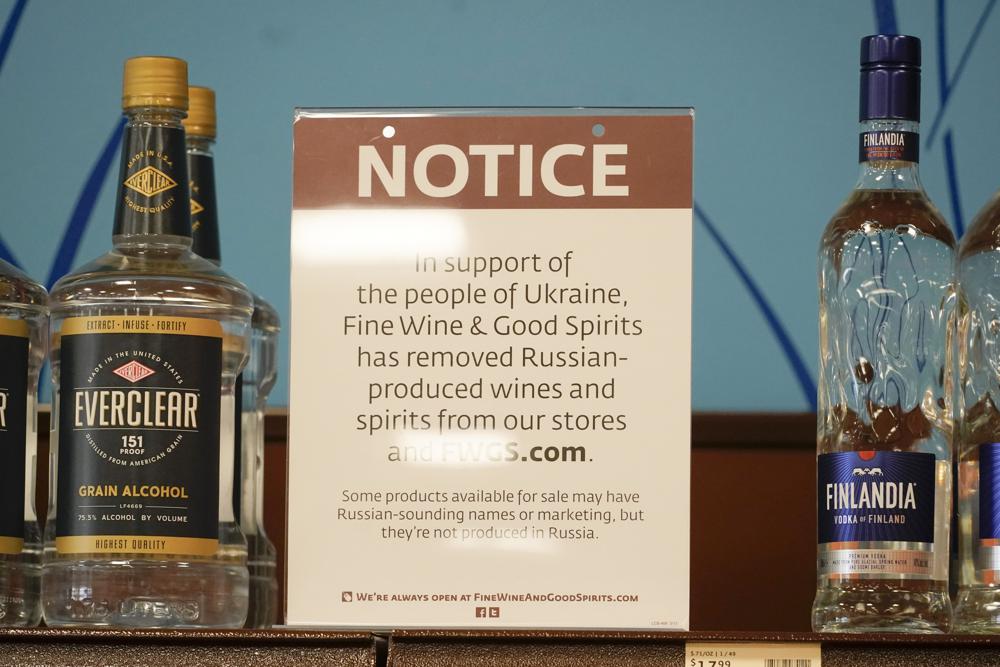
Seeking to tighten the financial squeeze on Russia over its war against Ukraine, governors, and lawmakers in numerous U.S. states were taking actions Monday to pull state investments from Russian companies while encouraging private entities to do the same. The effect of sanctions by U.S. states often pales in comparison to national ones, but state officials said they wanted to show solidarity with Ukraine and do what they could to build upon the penalties imposed on Russia by the U.S. government and other Western nations. Georgia House Speaker David Ralston, a Republican, got a bipartisan standing ovation Monday when he told representatives he would seek to have the state’s retirement funds quickly divested from any Russian assets. “I don’t know about y’all, but I don’t want one penny of Georgians’ money going to subsidize Vladimir Putin,” Ralston said. “While our role in international affairs is limited, we make clear we stand with those who want to live in peace.” Some actions have been largely symbolic. The governors of Arizona, Pennsylvania, and Tennessee ordered their capitols lit with the blue and yellow colors of Ukraine’s flag. Minnesota Gov. Tim Walz, a Democrat, and Ohio Gov. Mike DeWine, a Republican, issued a joint statement condemning Russia’s invasion of Ukraine as co-chairs of the presidentially appointed Council of Governors. Other state actions have potential teeth. On Monday, the Indiana House passed legislation that would block Russian-controlled businesses and nonprofits from acquiring property in Indiana for one year. It now goes to the Senate. “Indiana will not be a safe haven for ill-gotten Russian funds, nor for its oligarchs trying to find financial shelter in the wake of Putin’s unconscionable invasion of Ukraine,” Democratic state Rep. Ryan Dvorak said while proposing the amendment last week. New York Gov. Kathy Hochul signed an executive order Sunday forbidding her state from doing business with Russia. She ordered state agencies to divest money and assets from companies or institutions aiding Russia in its war against Ukraine. The Democratic governor also said New York would welcome Ukrainian refugees, noting that New York already is home to the largest Ukrainian population in the U.S. Pennsylvania lawmakers said Monday they will file legislation requiring state pension funds to pull investments connected to the Russian government and its critical supporters. The state Treasury Department also has begun divesting its minimal holdings in Russian-based companies. In a memo to fellow senators, Democratic state Sen. Sharif Street said Pennsylvania “must wield our economic power to ensure that Russia faces grave consequences for their flagrant violations of international law and human cooperation.” Pennsylvania House Majority Leader Kerry Benninghoff, a Republican seeking co-sponsors for the legislation, said state lawmakers “have a moral obligation to ensure that our public fund investments are not inadvertently supporting those who are engaging in an unprovoked invasion of their democratically elected neighbors.” Arkansas lawmakers have filed proposals authorizing banks in the state to freeze the assets of Russian oligarchs and to require a boycott of Russian-made goods. A bipartisan group of California lawmakers said Monday they also will introduce legislation to divest public money from Russian state entities. Colorado Gov. Jared Polis, a Democrat, has banned state agencies from doing business with Russian state-owned firms and their subcontractors. Colorado’s $61 billion state pension fund is pulling $8 million from a Russian state-owned bank identified in federal sanctions. Governors in Connecticut, New Jersey, Virginia, and Washington also have ordered a review of whether any state money is going to Russian companies or investments supporting the Russian government. A North Dakota investment board was due to meet later this week to discuss its investments in Russia. “If our state can put one brick in the wall around Putin, it will be a good thing, and we intend to do all that we can in this regard,” said Washington Gov. Jay Inslee, a Democrat. Two prominent Republican governors, Florida’s Ron DeSantis and South Dakota’s Kristi Noem, who are widely seen as angling for a White House bid, mostly took aim at President Joe Biden rather than issue executive orders targeting Russia. They criticized his energy policies and said that had made it difficult to slap sanctions on Russia’s exports of oil and gas. Other governors are seeking to sever good-will relationships between their home states and those in Russia. Republican Gov. Larry Hogan announced Monday that he’s dissolving Maryland’s decades-old sister-state relationship with Russia’s Leningrad region after the invasion of Ukraine. Virginia Gov. Glenn Youngkin, a Republican, asked the cities of Norfolk and Roanoke to end their sister city partnerships with Russian cities. Iowa Gov. Kim Reynolds, a Republican, called for an end to its sister-state relationship with Stavrapol Krai, Russia, and a strengthening of its sister-state relationship with Cherkasy Oblast, Ukraine. Several states have expressed a willingness to provide housing to Ukrainian refugees. The Washington state House and Senate each have added amendments to their budget proposals setting aside $19 million to provide services and temporary housing to refugees who come from Ukraine. Texas Gov. Greg Abbott, a Republican, posted on Twitter over the weekend that he has asked restaurants and retailers “ to voluntarily remove all Russian products from their shelves.” Officials in Alabama, Iowa, New Hampshire, Ohio, Pennsylvania, Utah, Vermont, Virginia, and West Virginia — all states that control the sale of alcohol — have directed Russian-sourced alcohol to be removed from store shelves. “Utah stands in solidarity with Ukraine and will not support Russian enterprises, no matter how small the exchange,” Republican Utah Gov. Spencer Cox said. Republished with the permission of the Associated Press.
Donald Trump reasserts GOP dominance as others focus on midterms
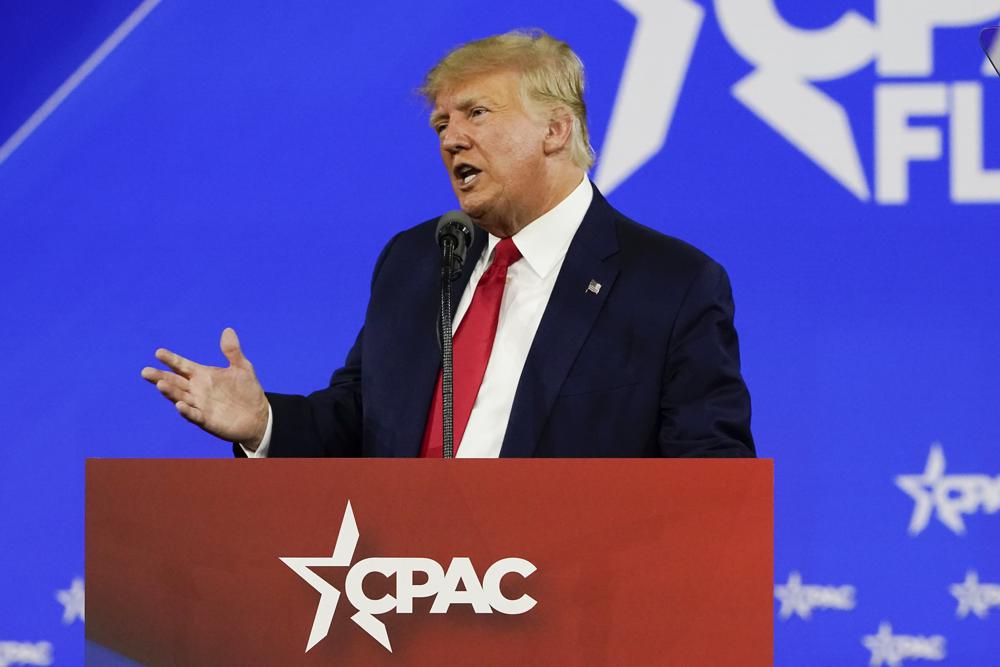
Leading Republicans spent much of three days avoiding Donald Trump’s chief grievances or ignoring him altogether as they unified behind a midterm message designed to win back the voters the polarizing former president alienated while in office. But by the end of the four-day Conservative Political Action Conference, Trump had reminded those who want to move on that he remains the most powerful voice in Republican politics. In his keynote address Saturday night, Trump indicated he planned to run for president a third time in 2024. He falsely blamed his 2020 election loss on widespread voter fraud, for which there is no evidence. And on Sunday, he was the overwhelming winner of a presidential preference straw poll of conference attendees. “We did it twice, and we’ll do it again,” Trump said of running in 2024. Even so, he has teased about a 2024 campaign before, and his vow this time was not necessarily ironclad. As invading Russian troops battled with Ukrainian forces, Trump also described Russian President Vladimir Putin as “smart.” “Of course he’s smart,” Trump said in his remarks Saturday, doubling down on praise of the Russian leader that many other Republicans have avoided after the invasion. “But the real problem is our leaders are dumb. Dumb. So dumb.” While Trump expressed support for the Ukrainian people and called the country’s president, Volodymyr Zelenskyy, a “brave man,” he also noted his ties with other leading autocrats. He specifically pointed to his friendly relationships with Xi Jinping of China and North Korean leader Kim Jong Un. Up until Trump’s appearance, lies about election fraud, the focus of last year’s conference, had been an afterthought among the top speakers. No one parroted Trump’s approving rhetoric toward Putin. And some leading Republicans didn’t even mention Trump’s name. Instead, those most likely to seek the GOP’s 2024 presidential nomination not named Trump united behind an agenda that includes more parental control of schools, opposition to pandemic-related mandates, and a fierce rejection of “woke” culture. The message from more than a half-dozen elected officials, delivered to thousands of mostly white activists at an event that usually celebrates far-right rhetoric, does not mean the party has turned its back on Trumpism. Far from it. The former president was a frequent topic among some of the conference’s lower-profile speakers. T-shirts proclaiming “Trump won” were being sold in the hallways. And in the straw poll of 2,574 conference attendees, Trump earned 59%, followed by Florida Gov. Ron DeSantis with 28%. No one else had more than 2%. When asked for their preference should Trump not run in 2024, DeSantis earned 61%, with no one else earning more than 6% of the vote. The straw poll only measured the opinion of those at the conference, not broader Republican sentiment. Aside from Trump, Florida Gov. Ron DeSantis was a crowd favorite throughout the four-day conference. Audience members applauded almost every time his name was mentioned, or his picture appeared on big screens. Conference organizer Matt Schlapp said Trump remains a dominant force, but he does not have a lock on the party’s base. “No. 1 is, Does he run again? And it’s overwhelming that people want him to,” Schlapp said. “But there’s a diversity of opinion.” And while Trump’s most controversial supporters were generally given lower-profile speaking slots over the four-day program, they were not excluded. Rep. Majorie Taylor Greene, R-Ga., appeared on a Saturday morning panel hours after being featured at a conference of pro-Trump white nationalists. Trump offered Taylor Greene a particularly warm shoutout during his speech as he ticked down the Republican officials in attendance. “I refuse to shut up,” Taylor Greene said earlier in the day during a brief appearance as she railed against “Democrat communists.” Despite Trump’s dominant place at the head of the Republican Party, other party leaders are increasingly optimistic they have found a forward-looking strategy to overcome pro-Trump extremism and expand the party’s appeal with control of Congress at stake in November. It’s essentially the same playbook that Virginia’s Republican Gov. Glenn Youngkin used last fall when he won in the swing state by avoiding Trump and his biggest grievances, including the false notion that the 2020 presidential election was plagued by mass voter fraud. “There are people that perhaps have never voted the same way any of you have in a presidential race, and they’re really angry,” Florida Sen. Marco Rubio said Friday. “And that’s why I believe that for all the negative we’ve heard, the pendulum is swinging.” Democrats are clinging to paper-thin majorities in the House and Senate, and voter sentiment has swung in an ominous direction for them since President Joe Biden took office in January 2021. In an AP-NORC poll conducted Feb. 18-21, 70% of Americans said the country was headed in the wrong direction. As few as 44% said the same in April 2021. Some leading Republicans seemed intent at CPAC on not helping Democrats by embracing Trump. Missouri Sen. Josh Hawley, who tried to block the certification of Biden’s electoral victory after the Jan. 6 Capitol attack, sidestepped a question about whether he would challenge Trump in a 2024 prospective matchup. “I’ve said I’m not planning to run for president,” Hawley said. He also declined to say whether he wants Trump to run again in 2024: “I never give him advice, including on this.” Hawley also said it was a mistake for Republicans like Trump to offer soft praise for Putin: “Putin is our enemy. Let’s be clear about that.” DeSantis, who has also refused to rule out a 2024 presidential bid should Trump run, did not mention the former president in his 20-minute address, focusing instead on his resistance to mask and vaccine mandates. Trump’s former secretary of state, Mike Pompeo, spoke about his work in the Trump administration, but he did not repeat his own recent flattering comments about Putin, in which he called the Russian leader “very capable” and said he has “enormous respect for him.” South Dakota Gov. Kristi
Kay Ivey signs on to joint U.S.-Canada letter in support of protesting truck drivers

Governor Kay Ivey, along with 15 other governors, has signed on to a letter to Prime Minister Justin Trudeau and President Joe Biden asking them to immediately reinstate the vaccine and quarantine exemptions available to cross border truck drivers. Since late January, Canadian truckers have blocked some of the busiest border crossings between Canada and the U.S. The demonstrations initially focused on Canada’s vaccine requirement for truckers entering the country but quickly became a broad attack on COVID-19 precautions and Trudeau himself. Demonstrations and blockades have shut down border crossings into the U.S. and inflicted economic damage on both countries. Ivey stated on Twitter, “The truck drivers we’ve seen peacefully protesting in Canada simply want common sense reinstated & freedoms protected. I support them and am joining my fellow governors in calling Prime Minister Trudeau & @POTUS to immediately allow exemptions for cross border truck drivers. These types of unnecessary mandates would continue to exacerbate supply chain and economic issues.” The letter emphasizes the need for the border to remain open because of COVID-19 supply chain issues. The letter states, “The timing of your decision to terminate the vaccine and quarantine exemptions could not have been worse, as North America already faces grave supply chain constraints. These constraints, combined with increasing inflation, place significant burdens on the residents of Canada and the United States. Furthermore, transportation associations have informed us that the lack of exemptions will force thousands of drivers out of the trucking industry, which is already facing a significant workforce shortage. The removal of these exemptions is ultimately unnecessary, and we cannot afford to lose any more truck drivers who transport food and other vital supplies across the border.” Last week, the White House stated, “The two leaders agreed that the actions of the individuals who are obstructing travel and commerce between our two countries are having significant direct impacts on citizens’ lives and livelihoods.” Other governors who signed the letter include Greg Gianforte (MT), Mike Dunleavy (AK), Asa Hutchinson (AR), Brian Kemp (GA), Brad Little (ID), Kim Reynolds (IA), Tate Reeves (MS), Mike Parson (MO), Pete Ricketts (NE), Doug Burgum (ND), Henry McMaster (SC), Kristi Noem (SD), Bill Lee (TN), Spencer Cox (UT), and Mark Gordon (WY).
Jim Zeigler: First Kay Ivey ad for re-election contradicts what she did in the COVID epidemic
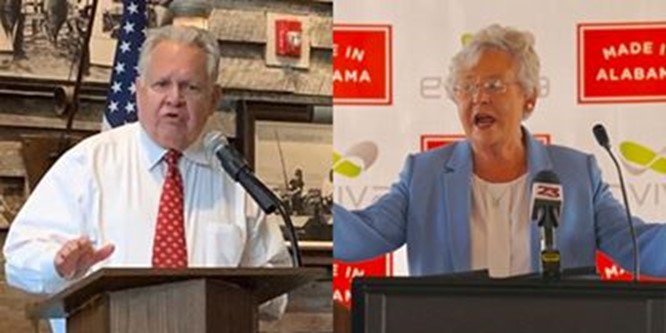
Gov. Kay Ivey has released the first TV ad of her 2022 campaign for re-election. In the spot, Ivey says, “It’s important to keep our jobs open and keep our people working.” But a potential opponent to Ivey says the ad contradicts what the Governor did during her response to the COVID epidemic. State Auditor Jim Zeigler said in a Facebook post and news release Wednesday: “That’s exactly the opposite of what Gov. Ivey did during her bumbling COVID response. She closed businesses and kept them closed. She favored out-of-state giants like Walmart and Target at the expense of local businesses. She put people out of work needlessly. How many of our state officials are speaking up about this and challenging the costly mistakes of the Ivey administration? Name one. Alabama needs a governor like Ron DeSantis (R-Fl) or Kristi Noem (R-SD).” Zeigler said last week he is considering setting up an exploratory campaign testing the waters for a possible gubernatorial run. He is term-limited and cannot run again for State Auditor. He says he will make a decision before the annual state Republican meeting on August 28. “The title of Gov. Ivey’s ad is ‘Four More Years.’ We don’t need four more years of gas tax increases. We don’t need four more years of Ivey attempts to put tolls on Alabama’s roads and bridges. We don’t need four more years of Ivey attempts to give out-of-state millionaires 30-year leases on Alabama prisons that leave our state owning zero equity in those rented prisons. We don’t need four more years of government behind closed doors,” Zeigler said.
Kay Ivey joins 19 other governors urging action at the U.S. border
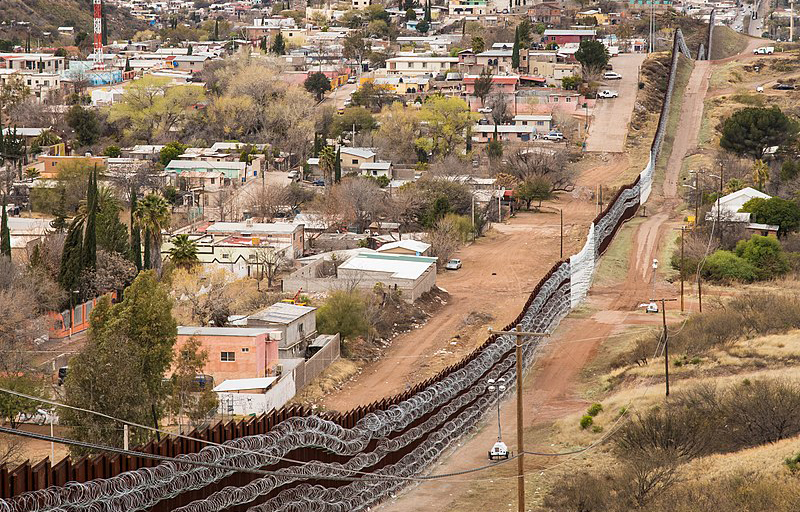
Today Gov. Kay Ivey joined 19 other governors in a call for Joe Biden to take action and reverse their policies regarding the U.S. border. The group wrote a letter to President Biden and Vice-President Kamala Harris describing worsening conditions at the border. In April, Arizona’s governor Doug Ducey declared a state of emergency at the southern border and deployed the Arizona National Guard to support law enforcement agencies in border regions. In May, the Associated Press reported that the State Emergency Council voted to allocate approximately $2.5 million to help pay for the deployment of 250 National Guard personnel to free up law enforcement officers in border towns along the Arizona-Mexico border. Part of the letter states, “This Administration has enticed a rush of migrants to our border and incentivized an influx of illegalcrossings by using irresponsible rhetoric and reversing a slew of policies—from halting border wall construction to eliminating asylum agreements to refusing to enforce immigration laws.” The letter concluded, stating, “At a time when our country is trying to recover from a once-in-a-generation pandemic, the last thing weneed is a self-created crisis that exploits families, undermines public safety, and threatens our national security. We urge you to take action to end the humanitarian crisis and secure our southern border immediately.” Gov. Ivey stated on Twitter, “I’m proud to sign on to this letter with fellow governors urging @POTUS & @VP to take immediate action on the crisis happening at America’s southern border. The crisis is too big to ignore & is now spilling over the border of all of our states.” I’m proud to sign on to this letter with fellow governors urging @POTUS & @VP to take immediate action on the crisis happening at America’s southern border. The crisis is too big to ignore & is now spilling over the border of all of our states. #alpolitics @WhiteHouse pic.twitter.com/lyX6AQsyaE — Governor Kay Ivey (@GovernorKayIvey) May 11, 2021 Other governors who signed the letter are Governors Bill Lee, Tennessee; Doug Ducey, Arizona; Asa Hutchinson, Arkansas; Brian Kemp, Georgia; Brad Little, Idaho; Eric Holcomb, Indiana; Kim Reynolds, Iowa; Tate Reeves, Mississippi; Mike Parson, Missouri; Greg Gianforte, Montana; Pete Ricketts, Nebraska; Chris Sununu, New Hampshire; Doug Burgum, North Dakota; Kevin Stitt, Oklahoma; Henry McMaster, South Carolina; Kristi Noem, South Dakota; Greg Abbott, Texas; Spencer Cox, Utah; and Mark Gordon, Wyoming.


